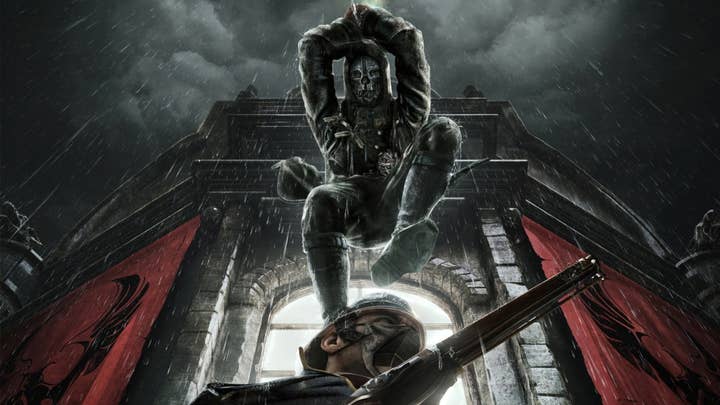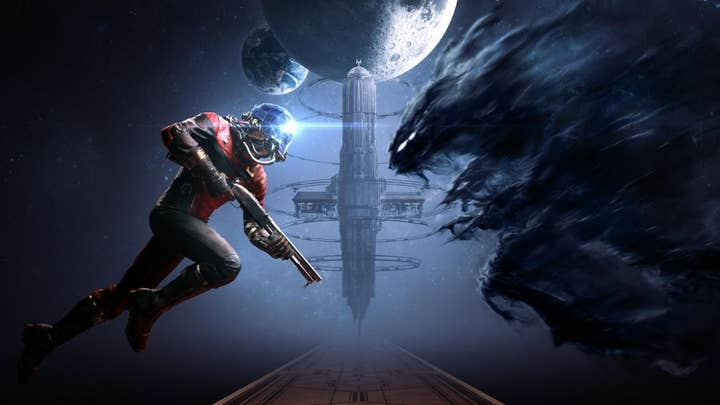Leaving Arkane: The pressure of "making impossible things"
Raphael Colantonio on leaving the studio he founded, and an industry "at odds with vacations, with time off, with just creatively recharging"
Arkane Studios' Raphael Colantonio has talked about the "mix of sadness and relief" he feels about leaving the company he created 18 years ago; a difficult decision motivated by the physically and mentally demanding structure of the games industry.
Colantonio was in Barcelona to attend Gamelab, a late addition to the Spanish conference's speaker line-up. Earlier this week, the day before the event began, Colantonio announced his departure from Arkane Studios, the company he founded in Lyon, France in 1999, and that ZeniMax Media acquired in 2010.
"It's a mixed bag of emotions, because I love Arkane and I love Bethesda," he said in an onstage interview. "It's been 18 years of very fascinating adventures - some super hard times, because as you know we were independent, and we almost went out of business several times."
"That's been my life for the past 18 years; alternating between the pressure of lacking oxygen and the pressure of making impossible things"
Colantonio recounted three periods during which Arkane was "a month or two away" from running out of money. On each occasion, it found a way to survive, the last of which was its acquisition by ZeniMax Media. Reflecting on his mindset during those years of struggle, Colantonio said, "the belief that anything was possible was what made it possible." That idealism allowed Arkane to push ahead even as new projects found no interest or support from publishers.
"We are surrounded by way too many people who will talk down your ideas," he said. "'Look at those numbers. It doesn't make any sense, why would you do that?'" When asked what advice he would give to his younger self now, he replied, "Don't worry too much, because I'm a worrier. Less now, but back then I was that guy. But then maybe that was part of the success, too."
Arkane's most prolific years came later, largely as a result of the Bethesda acquisition. At that point, in 2009, the studio had once again run into hard times, and it was an interview with GamesIndustry.biz - the content of which Colantonio jokingly summarised as "whine, whine, whine" - that alerted Bethesda to the possibility of bringing Arkane onboard.

Arkane now has large offices in both Lyon and Austin, Texas, where veteran game designer Harvey Smith is creative director. The post-ZeniMax era has been far busier for Arkane than before the acquisition; it released Dishonored 2 and Prey in the space of six months, with Dishonored: Death of the Outsider scheduled to follow in September this year. By way of comparison, Arkane's three major releases prior to its recent burst - Arx Fatalis, Dark Messiah of Might & Magic and Dishonored - were released across a span of a turbulent decade.
"There's a moment where, as an artist, you're not sure what you control and what you don't control any more"
Having guided Arkane through hard times to its current position of stability and productivity, Colantonio has decided it is time to think about himself for a while. "Leaving this is actually a hard, hard choice, but at the same time I've been doing this for 18 years," he said. "I feel like I've never ever sat down, for even a minute.
"It's been a non-stop run, and I do feel like I need to take a break and rest for a while, and spend time on more personal projects - play music, spend time with my son, anything that isn't work related and not pressure related"
Colantonio described "a mix of sadness and relief at the same time" at breaking away from the games industry, but it is a feeling that has crept up slowly over the course of the last year or two. Speaking to GamesIndustry.biz after his talk Colantonio clarified some of his statements, which sounded very much like a description of the kind of burnout that remains a prevalent issue in the industry.
In part, he says, it is an outcome of his specific experiences at Arkane; the "negative pressure" of the periods where the studio struggled to get projects off the ground, and the "positive pressure" of running a studio with a large number of employees and several projects to finish. "I will always favour the pressure of making things than the pressure of not having oxygen," he says. "But that's been my life for the past 18 years; alternating between the pressure of lacking oxygen and the pressure of making impossible things."
Since joining Bethesda, it has mostly been the positive pressure of "making impossible things", recruiting the right people, and creating a culture that will sustain Arkane's creative values even after he leaves. He is clearly proud of what Arkane has become, but he admits that growth and stability do come at a price for people who once thrived on the creativity and personal expression that game development can offer.
"I'm sure some people could go like this for 30 years and work it. But I can't, and I think a lot of other people can't either"
"Harvey [Smith] would probably say the same, but there was a moment when we were working on Dishonored that we became so big - and I'm not talking about 600 people team big, but it was big enough for us - there's a moment where, as an artist, you're not sure what you control and what you don't control any more."
When Colantonio was making Arx Fatalis, he did almost every job that goes into making a game: coding, AI, animation, even making some of the 3D objects. "You feel really involved," he says. "But the more the industry goes towards huge, huge games, where you worry about modelling the wind in the eyebrows, and you need an eyebrow specialist that you have to hire from Hollywood who costs a fortune.
"The games industry has changed in that regard, so working on something even like a piece of music - something that is yours entirely - feels very good. That's why I'm writing music. That's why Harvey is writing his book. It's important to us to feel like we own something."

Amidst the positive and negative pressure, and buoyed by the knowledge that Arkane has a team with both abundant talent and a common vision, the desire to reclaim his personal space grew stronger and stronger. "I'm sure some people could go like this for 30 years and work it," he says. "But I can't, and I think a lot of other people can't either. And that's because of the way [the industry] is set up.
"If you think about movies, people gather to make a movie, and they gather three or four people - the script guy, the director, and so on - and then they go deep and film the thing for a few months, and then everybody disbands. Then you have the post-production and effects people, but they work for different companies. Then they all go on vacation for three years."
"I need time to get my dreaming machine to come back, but maybe that's a possibility. Something small, where I don't have to worry about feeding 100 people"
This is not the case in the part of the games business that a studio like Arkane operates, which Colantonio believes is structured in a very different way to other entertainment industries.
"Anything that is extremely creative and also extremely hard is difficult to turn it into a machine where we can make the thing non-stop - here comes a DLC, here comes a this, here comes a that," he says. "And I'm not saying there's a solution, by the way; I'm not saying they're doing it wrong, or we're doing it wrong, or anyone is doing this wrong.
"It's just that it's at odds with vacations, with time off, with just creatively recharging. You need to recharge."
And the alternative is not necessarily more desirable. If AAA games resembled the film industry he described there would be more redundancies, and Colantonio is proud to say that Arkane has never laid off an employee by ramping up and down around a project. "You have this company with tons and tons of people that you have to pay every month, so it's not like there's a solution. 'So what we do is make a game and then lay everyone off'. We've never done that. Bethesda never does that. They keep their people. But something's got to give.
"It's the way it is, and it's why some people get burnt out. It's too hard."
In both his onstage interview and our conversation afterwards, Colantonio displayed an obvious affection for the early days of Arkane, as difficult as they were. The studio was four people and the term 'indie' was a decade away from existing, but he insists "we had that vibe." Those days were, he admits, "very exciting", but a future in which Raphael Colantonio returns as an indie developer is not one he can contemplate just yet. Now is the time to rest, and after 18 years caught between a lack of oxygen and impossible tasks, few would begrudge him the luxury of doing so.
"I need time to get my dreaming machine to come back, but maybe that's a possibility," he says. "Something small, where I don't have to worry about feeding 100 people."








